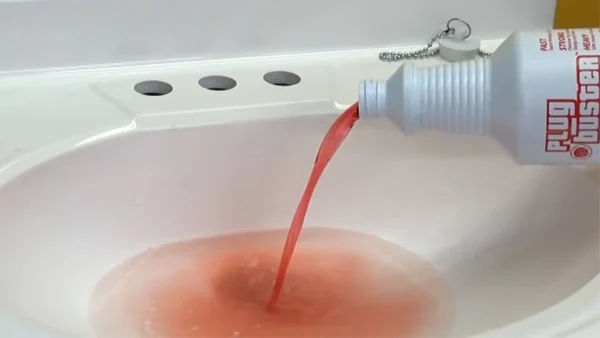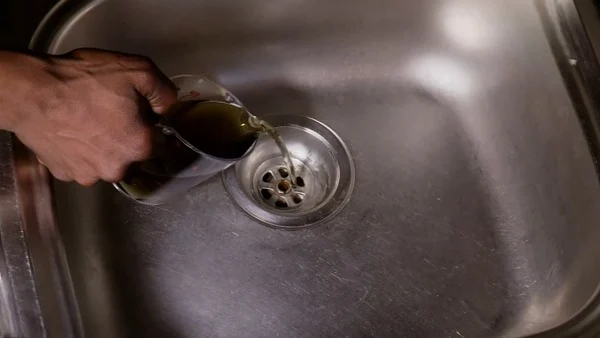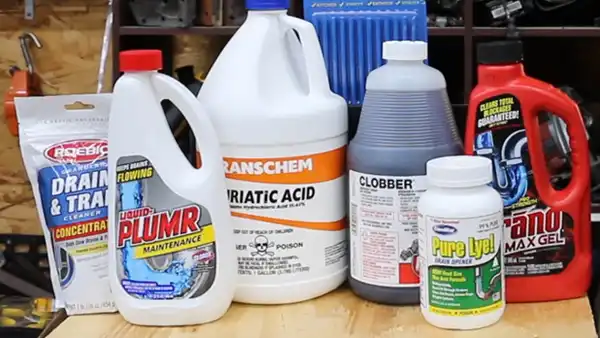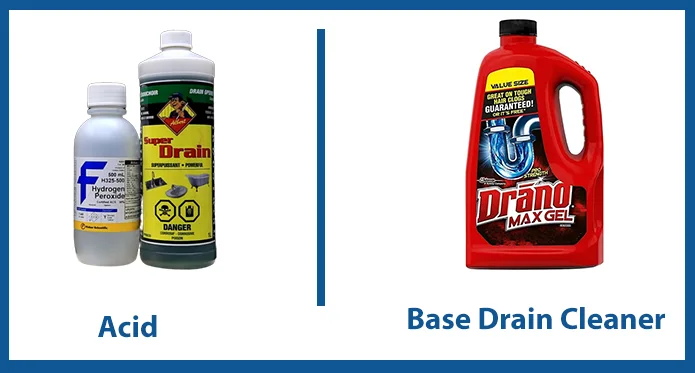Last Updated on August 28, 2023
Clogged drains are a common household problem. A clogged drain can cause water to back up and overflow, leading to costly damage. If you’ve ever had a clogged drain, you know the feeling of desperation that comes with it. So, are you looking for a drain cleaner that will easily clear even the toughest clogs?
You may wonder whether an acid or base cleaner is the best option. Acidic drain cleaners are some of the most powerful and effective tools for clearing clogged drains. If used improperly, they can also be very dangerous. In contrast, basic drain cleaners also corrosive or powerful, but they are much safer to use.
So what’s the difference between acid and base drain cleaners? And which one should you use? We are going to take a look at each acid and base drain cleaner so that you will have the knowledge to make the right choice.
What Is the Difference Between Acid vs Base Drain Cleaners?

Acid vs base drain cleaners is two common types of products used to unclog drains. Both work by using chemicals to break down the things that are clogging the drain, such as hair, soap scum, and grease. Despite this, there are some key differences between these two types of cleaners.
Below is a brief comparison of acid vs. base drain cleaners:
1. Ingredients
The main difference between acid drain cleaners and base drain cleaners is their chemical composition. Acidic drain cleaners contain sulfuric acid or hydrochloric acid. These are very strong acids that can eat through organic matter, grease, and hair that are clogging your drain.
In contrast, Base drain cleaners are also known as alkaline drain cleaners. These products are typically made with lye, which is a caustic substance. These chemical drain cleaners react with the water to create a foaming action that helps to break down the grease and grime.
Each type has its own advantages and disadvantages.
The advantages and disadvantages of acidic drain cleaners:
Advantages:
- More effective at breaking down tougher clogs
- Can be used on a wider range of drain types
- Also good for other cleaning purposes
Disadvantages:
- Can be more dangerous to use
- Can damage your pipes if used too frequently
Basic drain cleaner advantages and disadvantages:
Advantages:
- Safer to use
- User-friendly
- Creates a foaming action that can help break down the clog
- Often more affordable
Disadvantages:
- Not as effective at breaking down tough clogs
- Can only be used on certain types of drains
2. Safety
An acid drain cleaner differs from a base drain cleaner in terms of safety. Acid-based cleaners are prone to lead to burns, both to the skin and to the eyes, if they come into contact with them. They can also eat away at pipes, causing structural damage.
Base-based drain cleaners, on the other hand, are less corrosive and safer to use. The substances can still be harmful if swallowed or inhaled or absorbed through mucous membranes. Overall, both types of cleaners can effectively clear clogged drains, but it is important to consider safety when choosing which one to use.
Safety Precautions with Acidic Drain Cleaners:
- Wear gloves and eye protection
- Do not use on plastic pipes
- Avoid mixing with other cleaners
- Flush with water after use
- Take proper knowledge before using
- Keep out of reach of children
Safety Precautions with Base Drain Cleaners:
- Wear gloves and protective musk
- Avoid contact with skin and eyes
- Read the directions carefully before use
- Use in well-ventilated areas
- Rinse with water after use
3. Uses
Most Drain cleaners are either acid or base. The difference between the two is important to understand before using a drain cleaner. The intended use is also key to knowing.
Acidic drain cleaners are typically used for slow-moving drains that are clogged with buildups, such as hair, grease, and soap scum. They work by dissolving the build-up so that it can be flushed out of the drain. The use of acidic cleaners is also sometimes used to remove mineral deposits from tiles and porcelain and to remove rust stains from metal surfaces.
Base or alkaline drain cleaners are usually used for more serious clogs, such as those caused by grease, oils, and fat. They work by breaking down the material that is causing the clog in the drain, allowing it to drain off. Ovens and BBQ grills can also be cleaned with base cleaners.
4. Availability
It could be argued that another key differentiation lies in the availability of these cleaners. Acid cleaners are not as widely available and are often sold under generic names or as generic products. This type of drain cleaner is not as commonly found in stores, making them less accessible to the average consumer.
On the other hand, base drain cleaners are more readily available and can often be found under brand names. They are also carried by more stores, making them more accessible to consumers. This is likely because they are considered to be safer than acid cleaners.
Is Liquid Drain Cleaner An Acid Or Base?

It depends on the product. Liquid drain cleaners typically contain either a strong acid or a strong base as their active ingredient. Sulfuric acid is the most common active ingredient in acidic drain cleaners, while lye (sodium hydroxide) or potassium hydroxide is usually found in basic drain cleaners.
Acids are corrosive and can damage metal pipes, so it’s important to read the label carefully and follow the directions. Alternatively, base drain cleaners are not as corrosive but can still be damaging if used incorrectly. It is not recommended to mix drain cleaners, as the resulting reaction could be violent and lead to poisonous fumes.
Aside from that, spraying caustic, corrosive substances around your home is also best avoided. Any cleaning product should be handled carefully and with the appropriate chemical drain cleaner.
At What PH Should Acidic And Base Drain Cleaner Be?

Most people are familiar with the terms acid and base, but fewer know what they really mean. In a chemical context, acids and bases are defined by their ability to donate or accept protons. This defines a scale known as the pH scale.
There are a variety of acidic and base drain cleaners offered in the marketplace, each with its own pH level. Sulfuric or hydrochloric acid-based cleaners have a pH level of 1 to 2, making them some of the most acidic options. Drain cleaning products containing baking soda are more alkaline, weighing between 10 and 14 on a pH scale ranging from 0 to 14.
Acids have a pH below 7, while bases have a pH above 7. This is why acid drain cleaners are more likely to cause damage to your pipes than base drain cleaners. While this may be true, it does not mean that base drain cleaners are completely safe. If used excessively, they can still cause damage to your plumbing.
No matter which drain cleaner you choose, always follow the instructions on the packaging, as these products can be harmful if misused. Therefore, it is always advisable to read labels carefully and utilize drain cleaners moderately, no matter what type you choose.
What Type of Base Cleaner Is Recommended for Unblocking Drains?

There are a few different types of base drain cleaners available on the market, but lye (sodium hydroxide) is generally considered to be the most effective. This is because it breaks down grease and fat quickly and effectively. Potassium hydroxide-based cleaners are also commonly used, although they are not as strong as lye-based cleaners.
Lye is a corrosive substance that can break down organic matter, making it ideal for unblocking clogged drains. The chemical is also highly caustic and can cause burns when it comes into contact with the skin. For this reason, it is important to use lye drain cleaners with caution and only as a last resort.
Unclog your drain using sodium hydroxide base drain cleaner:
- First, wear gloves and other safety gear to protect your skin from the caustic drain cleaner.
- Pour a bottle or a container with cold water. Then, add two or three cups of sodium hydroxide flakes and mix them well. Use glass or plastic containers only, as lye can corrode metal.
- Pour the mixture down the drain and leave it for 25 to 30 minutes to work through the blockage.
- And lastly, flush the drain with hot water to remove any residual lye.
As you can see, using a base drain cleaner is not a difficult task, but it is important to use caution. Always follow the directions on the packaging and use drain cleaners sparingly to avoid damaging your plumbing.
Can Acidic Drain Cleaner Damage PVC Or ABS Pipes?

Yes, it is possible for acidic drain cleaners to damage PVC or ABS pipes. The cleaners work by breaking down the clog, but the caustic materials can also eat away at the pipe itself. PVC pipe, galvanized steel, copper, and iron pipes are all susceptible to damage from acidic drain cleaners.
Most drain cleaners nowadays are less acidic, but a few older, more potent formulas can still be found on the market. Their active ingredient, sulfuric acid, usually has a low pH. If used frequently or in large quantities, these cleaners can slowly eat away at the pipe, causing it to become thinner and weaker over time.
In some cases, the damage may not be immediately obvious, but it will eventually lead to leaks or even pipe failure. To avoid this problem, using only non-acidic drain cleaners on PVC or ABS pipes is best.
Does Base Drain Cleaner Damage Plastic Pipes?
A base drain cleaner is one of the most commonly used products for clearing clogged drains. Despite this, most people are unaware of the potential damage these products can cause to plastic pipes. When caustic materials come into contact with plastic, they can produce a chemical reaction that produces heat.
This heat can cause the pipe to melt or warp, which can lead to leaks. Despite this, some factors can contribute to pipe damage, such as the type of cleaner used, the amount of time it is left in the pipe, and the type of pipe. For example, cleaners that contain sulfuric acid are more likely to damage pipes than those that contain lye.
If a cleaner is left in a pipe for an extended period of time, it can eat away at the pipe material. Also, caustic drain cleaners can also corrode metal pipes, causing them to eventually leak as well.
Is Baking Soda a Base or Acid?
Baking soda is a common household ingredient with a variety of uses, from drain cleaning to cooking. But what many people don’t know is that baking soda is actually a base. Bases are chemical compounds that react with acids to neutralize them.
When baking soda comes into contact with an acid, the two substances react to form carbon dioxide gas and water. This reaction is what gives baking soda its characteristic fizz. Apart from its use in Chemistry, baking soda can also be used as a household cleaner or deodorizer.
When mixed with water, it makes an effective cleaning solution for countertops, floors, and more. And when sprinkled on carpets or upholstery, it can help to remove odors. So the next time you reach for a box of baking soda, remember that this versatile substance is more than just a kitchen staple – it’s also a powerful base.
Which Drain Cleaner Is Most Effective: Acid vs Base?
It’s a matter of preference, really. Some people swear by acidic drain cleaners, while others prefer basic cleaners. Acidic cleaners are usually faster-acting and more powerful. They can eat through clogs quickly and effectively. Despite this, they are also more dangerous to use.
Basic cleaners are also as powerful as acidic cleaners, but they’re safer to use. If you have young children or pets in your home, you might want to stick with basic cleaners just to be on the safe side. Ultimately, it’s up to you to decide which type of cleaner you prefer.
So now that you know how acid drain cleaners differ from base drain cleaners and the pros and cons of each type. We hope that you’ll be able to make an informed decision the next time you need to clear the drain clog.


